Premier League: How football 'made in England' got big in USA
- Published
FC Harlem leads US football revolution
Roger Bennett grew up in Liverpool in the 1980s with posters of Ferris Bueller, The Fridge and Bob Latchford on his bedroom wall.
So it is hardly surprising he would find himself in the US in the 1990s, looking for work and trying to find a way to watch Everton games.
"When I first moved here I would go to a bar on Saturday mornings and there would be about a dozen Brits there," said Bennett, who got his dad to hold the radio up to the phone so he could listen to Everton's 1995 FA Cup semi-final win over Spurs (he was presumably too broke to repeat the trick for the final).
"We got one game a week then and it would often be something awful like Sheffield Wednesday versus Leicester.
"Every now and then an American would wander in and ask 'is Full-ham on?' To which the chilling answer from the scariest-looking Brit would be 'walk on, mate, walk on.'
"The impression was that global football was a lecture room and Americans were lucky to be allowed in and they had to keep their hands down.
"Now they have full-throatedly fallen in love with football and it is a joyous thing."
The evidence of that was clear at the Brooklyn Expo Center, where Bennett and fellow ex-pat Michael Davies were about to hold their most ambitious lecture yet: a two-day celebration of what most of the attendees who I spoke to called "soccer…sorry, football".
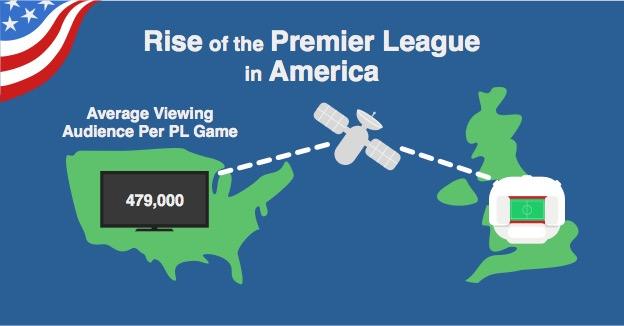
Every PL game is available on US TV and audiences are rising fast, despite the fact Saturday's early game starts at 4.45am on the West Coast
There was a queue of 1,300 customers around the building, most of them wearing English football club shirts or scarves, bartenders lining up pints of IPA and stout in the beer tent, and staff at the food stall filling the heated shelves with chicken and mushroom pies.
But more startling than this giddy outbreak of Anglophilia in what is meant to be New York's coolest neighbourhood was the crowd gathered in the VIP room.
Because there - in the borough that is home to the NBA's Brooklyn Nets and NHL's New York Islanders and which gave birth to American sporting icons like the Dodgers, Michael Jordan and Vince Lombardi - were the boss of the Premier League and the chairmen or chief executives of four of his member clubs.
Oh, and the bosses of the USA's Major League Soccer and Germany's Bundesliga were on their way.
"This is about how much America loves world football, but also how much world football loves America," said Bennett, the best teacher a new student of the game could ever hope for, as he announced the start of Blazercon,, external the football convention spawned by his and Davies' phenomenally successful Men in Blazers podcast and TV show.
Equal parts Saint and Greavsie, Wayne's World and Alistair Cooke's Letter from America, Men in Blazers has gone from a conversation at a wedding about how much they miss football banter to becoming a weekly television show , externalon NBC Sports and what Bennett describes as "a beachhead" for the wave of invaders from across the Atlantic.
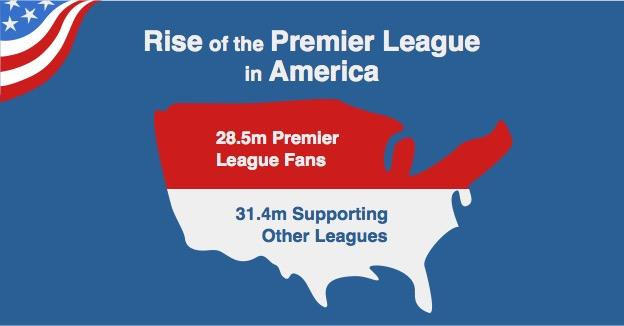
US fans are spoiled for choice with games from around the world on TV - the Premier League leads the way but the MLS and Mexican leagues are not far behind
"America getting football is what clubs in Europe have been dreaming about for decades," Bennett said.
"This is the final frontier and it is a fight for bandwidth."
Much like marriages, partners in double acts know when to jump in with a helpful explanation.
"There have been fans here for years," said Davies, a south Londoner who came to the States 25 years ago to play tennis but became a smash hit at producing TV shows and is now the Ernie Wise of US sports broadcasting's funniest duo.
"But many fans here are just falling in love with it now. That means they don't necessarily think Man Utd and Liverpool are that good.
"They might prefer Southampton or Crystal Palace or Bournemouth. It's a free-for-all!"
That sense of the American football market being a Wild West must be what brought the chairmen of those three clubs to Blazercon, and they were all in the front row when Premier League executive chairman Richard Scudamore opened the convention with a very relaxed question-and-answer session.
Richard Scudamore on the 39th game and football's growing popularity in North America
Scudamore has run England's top flight since 1999 but he knows the US well having visited often as a child and then later working for a newspaper group in New York, which explains how he flummoxed the Blazercon staff by arriving at the venue via the subway. They had been looking out for "the commissioner's motorcade".
But there was nothing understated about the numbers he delivered: the Premier League's live TV audiences in the US are up 150% since 2013 and there are now 60 million American adults who have seen at least one game of professional club soccer from somewhere in the world on TV.
"Football has had its ups and downs here but it really does seem to be on the rise and it's very encouraging, very pleasing and very exciting," Scudamore told me before his Q&A.
"Already the audiences here are averaging what you'd get in UK for a Sky or BT game.
"Of course, it's a bigger country. But in terms of unique adults, we had about 32 million Americans watch a game last season, compared with 14-15 million in the UK.
"So our audiences are big and growing. The day more people will be watching live here than in the UK will happen."
Even with the disparity in populations, that will be significant milestone for football fans still regularly lampooned in the UK as Ted Lasso-types , externalwho want Boston United to win the "Soccerbowl" and cannot pronounce Leicester City.
But Scudamore is right: it will happen, and soon.
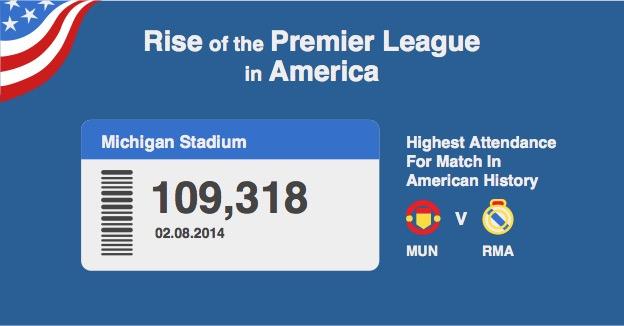
The pre-season circuit is an obvious money-spinner for European clubs but some are wondering if it is time for something more competitive
If you include the large numbers of fans who watched the games together, most experts think more than 30 million Americans watched the national team's games against Portugal and Belgium at the 2014 World Cup.
When the US hosted the World Cup in 1994, Bennett watched the games on obscure cable-TV channels with the Latino busboys in bars and restaurants. Nobody else cared.
So what has changed?
"Globalisation is the starting point," said Scudamore.
"People have got less and less parochial in their tastes - they like the best of everything. Sport, generally, has got more global."
He added that it was always a matter of time before the large number of boys and girls who play football in the US translated into an interest in the professional game, a trend that has been greatly helped by the internet.
"[US rights-holder] NBC says about 65% of their output is traditional TV, there is another segment watching on their PCs and there's another segment watching on tablets or mobile," he explained.
"But I think it's more than that. This conference is a testament to what can go on around the main show.
"It's about interaction and social media: it's about people wanting to consume a whole dialogue around the main event. Maybe football is the digital sport."
Scudamore was the warm-up act on Blazercon's first night to former Leyton Orient owner Barry Hearn. The US loves the former Leyton Orient owner and pub-sport impresario.
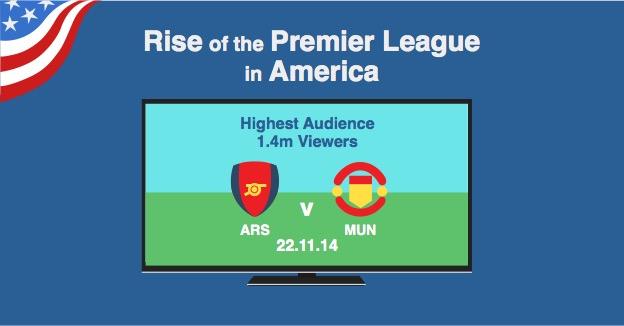
Big Premier League clashes do just as well in the US as they do here and it is only a matter of time before the new world audience overtakes the old world's
"I think there are a few reasons why this has happened now," said Hearn.
"There is a problem with head injuries in American football. Maybe parents are looking at that.
"Then there's the Hispanic interest - they have a lot of knowledge about football.
"But most important of all is that football is a soap opera. There are characters, huge money, lifestyle, aspirations, people from nothing who have become millions… there's a story."
As he said this, two Americans in Orient tops introduced themselves. They had decided to become Orient fans after hearing Hearn on a Men in Blazers podcast and had taken advantage of his offer to leave tickets at the Brisbane Road box office for visiting "Great Friends Of the Pod", or GFOPs as they are known on the Blazercon beachhead.
"But the great thing is that these guys support clubs," Hearn continued.
"They decide they want to be Orient fans or Aston Villa fans or Arsenal and so on. They are buying into football in the community.
"I think the new TV deal has helped by levelling the playing field out. So the advantages that Manchester United and Liverpool had, even Newcastle with their huge support, are lessened because of TV revenues.
"Clubs like Southampton and Leicester, with good management, can become major teams. That's quite attractive to the American market, because they love an underdog."
Southampton chairman Ralph Krueger, a Canadian who played ice hockey in Germany and coached in the NHL, agreed with Hearn about the opportunities North America offered clubs like his.
Krueger was almost evangelical when he told me about the plans he is hatching for Southampton FC soccer schools in the US and Canada.
Ayre hopes for Gerrard friendly
But then his counterpart at Bournemouth, Jeff Mostyn, was equally excited about the prospect of opening American branches of the Cherries supporters club, and Crystal Palace co-chairman Steve Parish was positively purring at the imminent arrival of American investment at Selhurst Park.
I could not help wondering whether this newfound enthusiasm for the US was a reaction to ignoring it for so long.
"If you go back over the last seven or eight years, I don't think anybody in the Premier League would have predicted that this would become a key market," admitted Liverpool chief executive Ian Ayre, who works for the club's American owners.
"Everybody always knew the opportunity in the US was huge but I think everybody is trying to catch up with the pick-up it's had in the last five or six years."
Was this a result of focusing too much on the exponential but harder-to-pin-down riches on offer in Asia?
"I think it is true about Asia but that's because it's the biggest game there and it was a natural fit. We've got millions of fans across Asia and have been touring there for years," said Ayre.
"But in recent times we've seen the growth here. We came here a couple of years ago and filled Yankee Stadium. We played at Fenway Park and the crowds just get bigger and bigger, the appetite gets bigger and bigger."
Hearn, who has sold snooker to China and darts to Singapore, distilled it even further.
"I have a rule in life: never ignore any market, any customer," he said.
"The North American market is good now but could be great. The Asian market is great but could be even better.
"The secret is to take it all, everywhere - don't leave a penny on the table."
Hearn is very unlikely now to ever own a Premier League team (although he still owns Orient's ground) but it is obvious that his rules in life have some currency around top-flight boardrooms.
For whatever reason - the all-pervasive popularity influence of EA Sport's Fifa games, the fact that Premier League games only have to compete with cartoons on Saturday mornings, not America's traditional big leagues, or what Brad Friedel described to me as the "fast and frenetic" product that appeals to American tastes - football has arrived in the States and it has a surprisingly familiar accent.
"I find it ridiculous," admitted Davies. "But I sort of understand it."
- Published19 November 2015
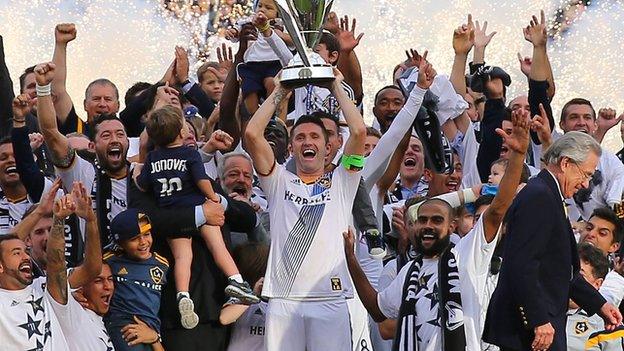
- Published18 November 2015
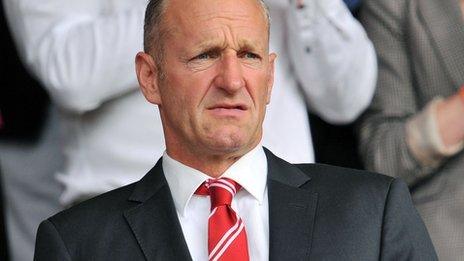
- Published17 November 2015
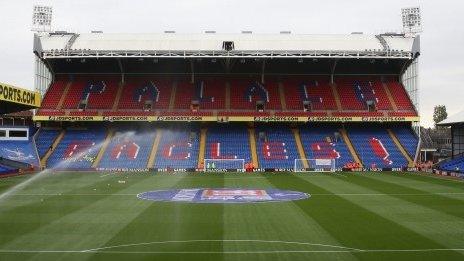
- Published20 June 2016
